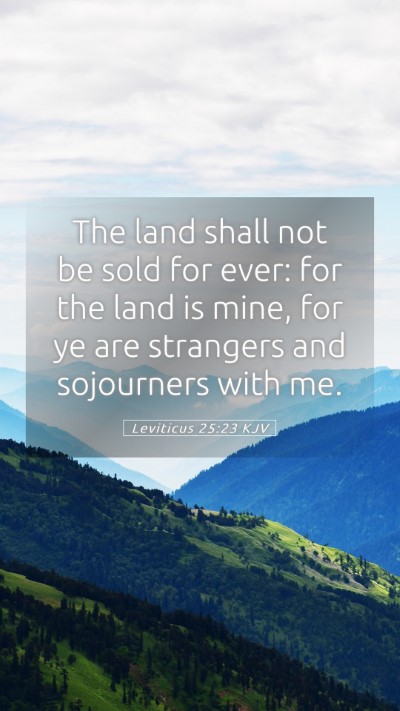Bible Verse Meaning and Commentary on Leviticus 25:23
Verse: "The land shall not be sold forever: for the land is mine; for ye are strangers and sojourners with me." (Leviticus 25:23)
This verse from Leviticus emphasizes the sanctity and divine ownership of the land promised to the Israelites. As we explore the meaning of Bible verses, particularly Leviticus 25:23, we uncover profound spiritual, cultural, and legal insights.
Meaning and Interpretation
The primary message of this verse is the reminder that the land belongs to God. This is reflected in the commentary of Matthew Henry, who notes that God's ownership necessitates that the land must not be treated as property to be permanently sold. It is a call to stewardship rather than ownership.
- Divine Ownership: The assertion that "the land is mine" indicates God's sovereignty. God's authority over the land serves as a basis for instructing the Israelites on how to manage their inheritance responsibly.
- Temporary Residency: The concept of being "strangers and sojourners" suggests that human beings are temporary inhabitants on God’s creation, aligning with the larger biblical theme of life being transient and dependent on divine mercy.
Bible Commentary Insights
Albert Barnes emphasizes the theological implications of this verse. He points out that the Israelites, as stewards, should regard the physical land not just as a resource but as a sacred trust from God. This understanding influences how they interact with the land, promoting sustainability and respect for natural resources.
Adam Clarke contextualizes this teaching within the wider framework of Israel's covenantal relationship with God. He explains that the land had profound implications for the identity of the Israelites, serving both as a physical inheritance and as a symbol of God’s promise. Clarke also suggests that this verse foreshadows New Testament themes of God’s Kingdom, where true inheritance is spiritual rather than material.
Application to Daily Life
Understanding Scripture often involves recognizing its relevance in modern life. Leviticus 25:23 serves as a reminder for contemporary believers to view their possessions and resources as temporary and under divine authority. This perspective encourages responsible stewardship in personal and communal settings.
- Cultural Reflection: In an age of ownership and consumerism, this verse invites individuals to reconsider how they interact with resources, treating them with respect and gratitude.
- Spiritual Insight: Believers are encouraged to seek a deeper relationship with God, acknowledging that true security is found in God’s provision rather than in material wealth.
Cross References
This verse connects well with several other biblical passages:
- Psalms 24:1: "The earth is the Lord's, and the fullness thereof." This Psalm echoes the sentiment of God's ownership and our role as stewards.
- Numbers 33:54: Provides insight on the distribution of land among the tribes of Israel, reinforcing the idea of divine allocation.
- 1 Chronicles 29:15: Emphasizes the transient nature of life and possessions, aligning with the teaching of Leviticus 25:23.
Conclusion
In summary, Leviticus 25:23 serves as a vital reminder of God’s sovereignty over the earth and encourages believers to practice stewardship over their resources. As you engage in Bible study groups or online Bible study, consider the applications of this verse and how it shapes your understanding of divine justice and mercy.
For those diving deeper into Biblical exegesis and scripture analysis, contemplating the concepts within Leviticus 25:23 can yield rich insights applicable to both personal faith and communal living. Whether studying individually or within Bible study lessons, this verse encourages reflection on what it means to live under God's authority.


